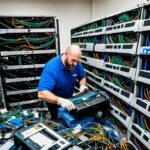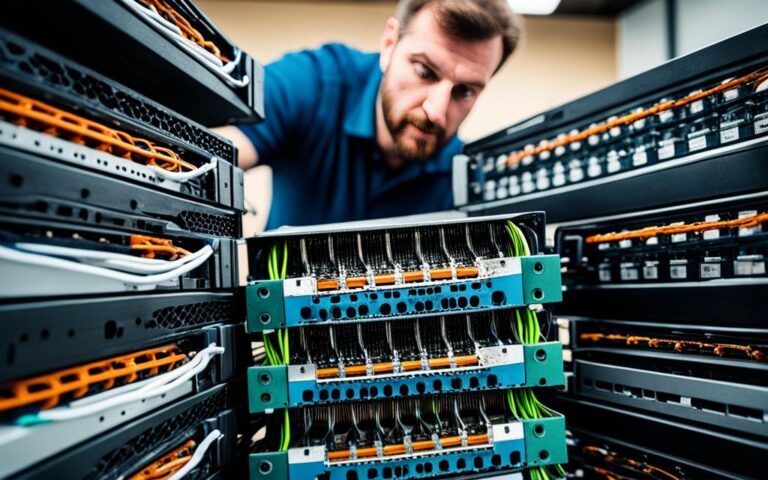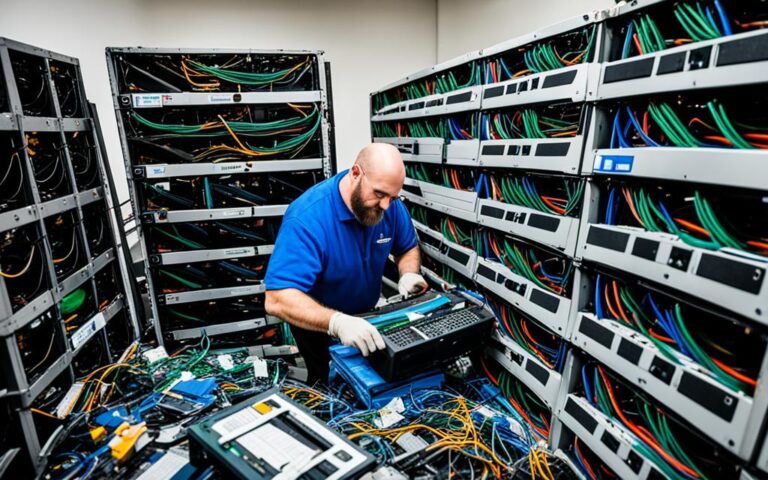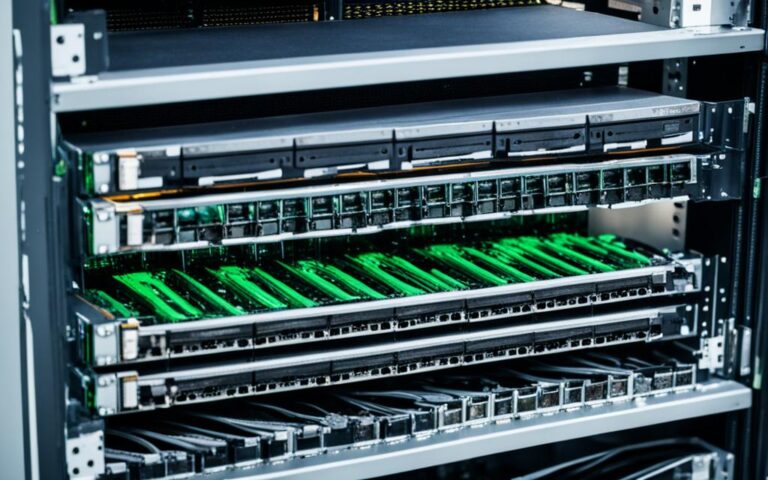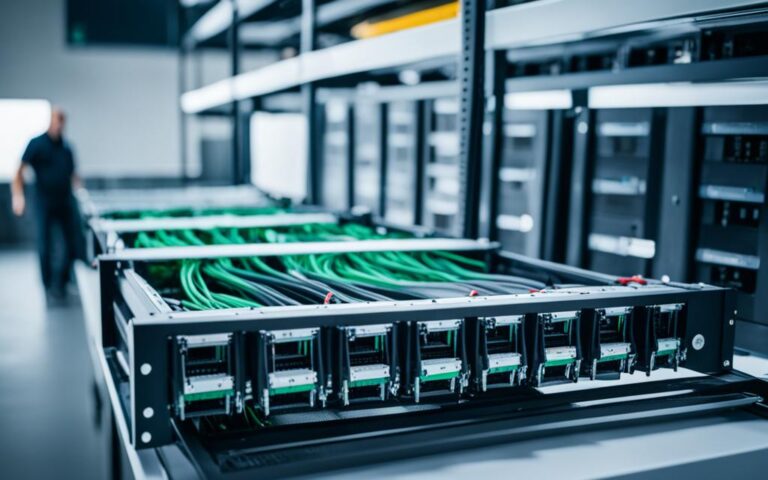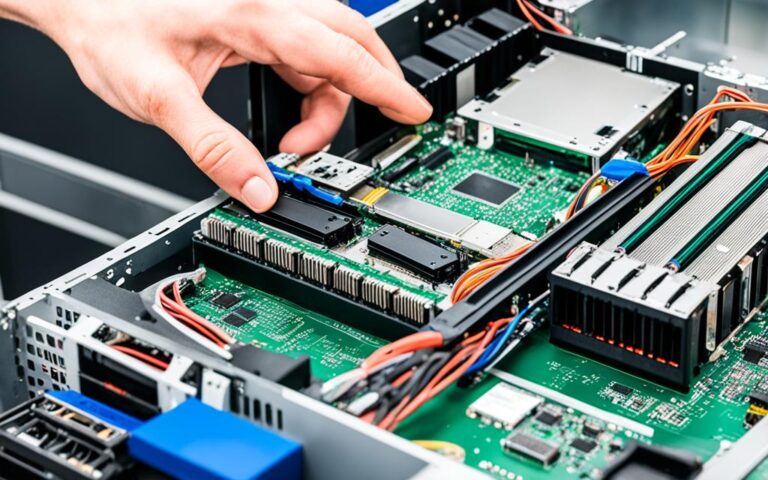How Server Recycling Supports the Transition to a Low-Carbon Economy
Server recycling plays a crucial role in supporting the transition to a low-carbon economy. By recycling servers, companies can reduce electronic waste and minimize their carbon footprint. The circular economy, which aims to minimize waste and maximize reuse of materials, is a key concept behind server recycling. Companies like Esker and Google are actively engaged in server recycling efforts, raising awareness, implementing recycling programs, and reducing their environmental footprint.
Server recycling contributes to the goal of creating a zero-waste economy and fosters sustainable tech practices in the UK. With the increasing need for sustainable practices and the growing concern for the environment, server recycling offers a tangible solution for businesses to align their operations with environmental responsibility and contribute to building a low-carbon economy. By embracing server recycling and sustainable tech practices, we can pave the way for a greener future in the UK and worldwide.
The Impact of Dedicated Servers on the Environment
Dedicated servers play a crucial role in powering the digital world, but their environmental impact cannot be overlooked. These servers, designed to handle extensive workloads and provide high-performance computing capabilities, have significant consequences for our planet.
Energy Usage: Dedicated servers consume large amounts of electricity. The constant demand for power to keep these servers running 24/7 contributes to substantial greenhouse gas emissions and exacerbates climate change.
Cooling Needs: Data centers that house dedicated servers require extensive cooling systems to prevent overheating. These cooling systems consume a considerable amount of energy, further increasing their environmental impact.
“The environmental consequences of dedicated servers extend beyond their energy consumption. The entire life cycle, from production to disposal, poses challenges to sustainable practices.”
– Jane Williams, Sustainability Expert
Electronic Waste: As technology advances, old and outdated servers become obsolete. Disposing of these servers and managing electronic waste is a challenging task. The improper handling of electronic waste poses significant environmental and health risks.
To address these environmental impacts, businesses and data centers must prioritize sustainability in their operations. They should explore innovative solutions to reduce energy consumption, improve cooling efficiency, and manage electronic waste effectively.
The Need for Sustainable Practices
The negative environmental consequences associated with dedicated servers highlight the urgent need for sustainable practices in the IT sector. Fostering a low-carbon economy requires a comprehensive approach that examines the entire lifecycle of servers, from production to retirement.
By adopting sustainable server management strategies, such as virtualization techniques, businesses can optimize server utilization and reduce the number of physical servers required. This not only improves efficiency but also minimizes energy consumption and electronic waste generation.
Furthermore, investing in renewable energy sources, such as solar or wind power, can help data centers power their operations more sustainably. Implementing energy-efficient infrastructure, including efficient cooling systems and server design, can also significantly reduce the environmental impact of dedicated servers.
The Role of Businesses in Promoting Sustainability
Businesses have a crucial role to play in promoting sustainability in the IT sector. By choosing dedicated server providers that prioritize environmental responsibility, companies can ensure that their operations align with sustainable practices.
Companies should consider partnering with server providers that offer server recycling programs or take measures to reduce their carbon footprint. Furthermore, adopting circular economy principles, such as reusing and refurbishing servers whenever possible, can contribute to a more sustainable approach.
In Summary: Dedicated servers have a significant environmental impact due to their energy consumption, cooling needs, and generation of electronic waste. It is essential for businesses to recognize the environmental consequences of dedicated servers and take proactive steps towards implementing sustainable practices. By promoting efficient energy use, reducing electronic waste, and investing in renewable energy sources, businesses can contribute to the transition to a low-carbon economy.
Sustainable Practices in Data Centers and Server Management
Implementing sustainable practices in data centers and server management is essential to mitigate the environmental impact of dedicated servers. By adopting these practices, businesses can support the transition to a low-carbon economy and demonstrate their commitment to environmental responsibility.
Energy Management and Efficiency
Effective energy management is crucial in reducing the carbon footprint of data centers. Implementing energy-efficient technologies and practices, such as virtualization and power management software, can significantly decrease energy consumption. By optimizing server usage and adopting high-efficiency cooling systems, data centers can operate more sustainably.
Reducing Emissions and Carbon Footprints
Data centers can reduce their emissions and carbon footprints by investing in renewable energy sources. Utilizing solar and wind power to generate electricity for server operations helps minimize reliance on fossil fuels. Additionally, implementing energy-efficient hardware and optimizing server utilization reduces energy waste and emissions.
Recycling and Waste Management
Proper recycling and waste management practices are essential in minimizing the environmental impact of server management. Disposing of old servers responsibly and recycling electronic waste helps prevent hazardous materials from entering landfills. By partnering with certified e-waste recyclers and implementing recycling programs, businesses can promote sustainable server disposal.
Water Conservation
Data centers consume significant amounts of water for cooling purposes. Implementing water conservation measures, such as using efficient cooling systems and reusing water, can reduce water consumption and minimize environmental impact.
Sustainable Server Design
Designing servers with sustainable principles in mind can significantly reduce electronic waste. Incorporating modular parts and components allows for efficient repairs and upgrades, extending the server’s product lifecycle. By promoting reusable and recyclable server designs, businesses can contribute to a more sustainable IT industry.
| Sustainable Practices | Benefits |
|---|---|
| Energy Management and Efficiency | – Reduced energy consumption – Lower operational costs – Decreased carbon emissions |
| Reducing Emissions and Carbon Footprints | – Minimized environmental impact – Increased use of renewable energy – Improved sustainability performance |
| Recycling and Waste Management | – Prevention of hazardous waste – Conservation of natural resources – Fulfillment of environmental regulations |
| Water Conservation | – Decreased water consumption – Lowered environmental footprint – Cost savings |
| Sustainable Server Design | – Minimized electronic waste – Extended product lifecycles – Enhanced resource efficiency |
Challenges and Opportunities in Achieving Sustainability
Achieving sustainability in the IT sector and promoting low-carbon practices in server management comes with both challenges and opportunities. These issues must be addressed to ensure a greener and more sustainable future.
The challenges we face
- The excessive use of energy: The IT sector consumes significant amounts of energy, contributing to carbon emissions and environmental degradation. Businesses must find ways to reduce energy consumption without compromising efficiency.
- The generation of electronic waste: As technology advances, the rapid turnover of server equipment leads to a growing amount of electronic waste. Proper disposal and recycling methods are needed to prevent environmental harm.
- Depletion of resources: The production and maintenance of servers require the use of finite resources, such as precious metals and minerals. Finding sustainable alternatives and reducing resource consumption is crucial.
- The sustainability of the supply chain: Ensuring sustainability throughout the entire supply chain, from manufacturing to disposal, is a complex challenge that requires collaboration and transparency among all stakeholders.
The opportunities that lie ahead
Despite these challenges, numerous opportunities exist for businesses to drive sustainability in the IT sector:
- Technological innovation: Advancements in technology can lead to more energy-efficient servers and sustainable practices, such as server virtualization and cloud computing.
- Advancements in renewable energy: The transition to renewable energy sources, such as solar and wind power, provides an opportunity to reduce carbon emissions associated with server operations.
- Improved waste management practices: Implementing effective recycling and circular economy principles can extend the lifespan of servers, reducing electronic waste and maximizing resource utilization.
“The challenges we face in achieving sustainability are immense, but so are the opportunities for innovation and positive change.” – Dr. Emily Jones, Sustainability Expert
By embracing these opportunities and overcoming the challenges, businesses can enhance their long-term profitability and contribute to global sustainability goals.
Conclusion
Server recycling is a vital catalyst for the transition to a low-carbon economy. By embracing sustainable practices in data centers and server management, businesses can significantly reduce their environmental impact and pave the way for a more sustainable future.
The challenges that arise in achieving sustainability within the IT sector are overshadowed by the opportunities for innovation and the potential for long-term profitability. Adopting a sustainable server provider not only aligns business operations with environmental responsibility but also demonstrates a firm commitment to building a low-carbon economy.
Through the adoption of server recycling and sustainable tech practices, we are equipped to cultivate a greener future not only in the United Kingdom but also on a global scale. By prioritizing these practices, businesses can actively contribute to ecological preservation and foster the growth of a low-carbon economy.
FAQ
How does server recycling support the transition to a low-carbon economy?
Server recycling plays a crucial role in supporting the transition to a low-carbon economy. It reduces electronic waste and minimizes the carbon footprint of companies. By recycling servers, businesses contribute to the circular economy, which aims to minimize waste and maximize reuse of materials. Companies like Esker and Google are actively engaged in server recycling efforts, raising awareness, implementing recycling programs, and reducing their environmental footprint.
What is the impact of dedicated servers on the environment?
Dedicated servers have a significant environmental impact due to their energy usage, cooling needs, and generation of electronic waste. These servers consume large amounts of electricity, contributing to greenhouse gas emissions and climate change. The cooling requirements of data centers that house dedicated servers also consume substantial energy. Additionally, the disposal of old servers and electronic waste poses environmental challenges.
What sustainable practices can be implemented in data centers and server management?
Implementing sustainable practices in data centers and server management is essential to mitigate the environmental impact of dedicated servers. Strategies such as energy management and efficiency, reducing emissions and carbon footprints, recycling and waste management, and water conservation can contribute to sustainability. Renewable energy sources, such as solar and wind power, can help data centers reduce their reliance on fossil fuels. Sustainable server design, including modular parts and long product lifecycles, promotes reuse and minimizes electronic waste.
What are the challenges and opportunities in achieving sustainability in the IT sector?
Achieving sustainability in the IT sector and promoting low-carbon practices in server management comes with challenges as well as opportunities. Challenges include the excessive use of energy, the generation of electronic waste, depletion of resources, and the sustainability of the supply chain. However, there are several opportunities to overcome these challenges, such as technological innovation, advancements in renewable energy, and improved waste management practices. Businesses that embrace sustainable server providers can enhance their long-term profitability and resilience while contributing to global sustainability goals.
How can server recycling contribute to a low-carbon economy and sustainable tech practices?
Server recycling is a crucial component in supporting the transition to a low-carbon economy. By implementing sustainable practices in data centers and server management, businesses can reduce their environmental impact and promote a more sustainable future. The challenges of achieving sustainability in the IT sector are outweighed by the opportunities for innovation and the potential for long-term profitability. Choosing a sustainable server provider aligns business operations with environmental responsibility and demonstrates a commitment to building a low-carbon economy. By embracing server recycling and sustainable tech practices, we can foster a greener future in the UK and worldwide.









